Best practice: Using Sales Intelligence Tools To Boost Conversion
Sales intelligence is known to be a software which enables sales professionals who use technology...
Due to the current climate, a lot of if not all businesses are having to adapt to the new ways of life.
This blog dives into the opinions of professionals, such as Mark Ritson, Peter Field and more, exploring what marketing you need and what you might want to consider during these unprecedented and uncertain times.
Guide:
How should marketers respond to the coronavirus?
Should your branding change due to COVID-19?
What Marketing Services should you think about incorporating in a recession?
How to implement transparency in digital marketing?
What can you be doing to help your business during Coronavirus?
How should marketers respond to the coronavirus?
The major challenge right now is working out what to do, with the budget which I expect has been cut over the past 6 months. Or at least spending has been reassessed.
When faced with an unexpected loss of funding and the pressure to prove return on investment, I imagine many marketers would focus on sales activation.
Sales activation is of course essential to any marketing strategy but when there’s a greater sense of uncertainty in the market, brand building is just as important - if not more.
Long-term relationships with brands will continue to grow as more content is consumed online, and will continue to grow as we come out the other side of the pandemic.
Here are some ideas on increasing share of voice digitally:
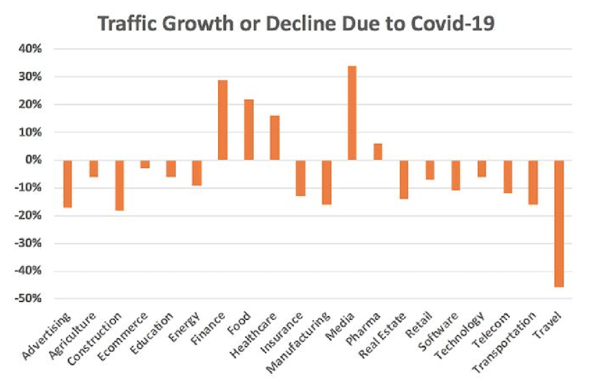
*Image from Neil Patel's Blog*
A question that many people do not have the answer to, yet are quick to say yes. However...that is not what the experts say!
Despite Digital Transformation acceleration due to COVID-19, and changing the way we deliver our marketing, the experts present evidence that is contrary to the mass hysteria to change everything:
The chart below from Orlando Wood's research published by The B2B Institute @ LinkedIn confirms that existing campaigns are still resonating.
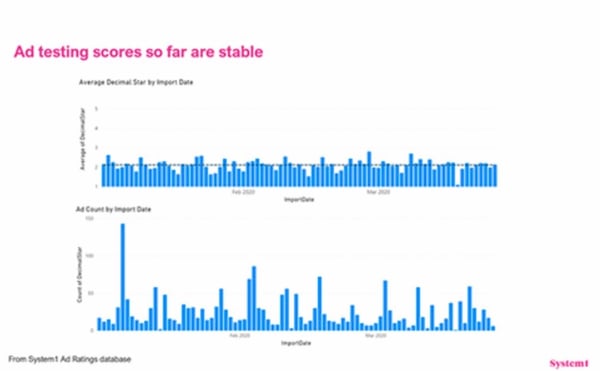
*Data from System1Group 2020 published in the series of All Weather Marketing essays by the B2B Institute*
The chart shows Daily ad testing scores in the US and UK in March holding stable (top), and number of ads airing each day (bottom).
Now, does anyone still believe that "Marketing will never be the same again" after lockdown? It's a difficult question but an important one nonetheless, which brings us onto our next topic where we look into what you should be paying close attention to in the coming months and year:
Working on the basis that the crisis will last 6-12 months, the recession then following 12-18 months, and recovery thereafter.
Ian Spence of Megabuyte suggests, in his blog that we assess the following:
1) Product or service;
How mission critical is your product?
Is it discretionary and easily deferred?
Would it have an impact on your client's business not to have it?
2) Customer market sector;
3) Revenue model;
4) Operational gearing;
5) Balance sheet (cash) position;
1) Customer relationships;
2) Competitive positioning
How well positioned are you for accelerated digital transformation - likely to be a feature of the recovery phase?
How agile is your company to take advantage?
You want to understand each and every one of these points and in order to achieve the above you will need to have the right resources to execute each one. You should establish what your priorities are and you can do this by thinking about the questions. But to do this, you need to be using the best tools. Have you got the right Marketing Services for a recession?
In the images below research shows you want to up your PR game initially; good communication with clients is essential in times of uncertainty, but once things settle into a depression? What then?
Well... The research is showing some of you will continue to invest in growth - no doubt from your more recession proof sectors:
You will need to consider what your priority is going to be moving forward:
1) Nurturing relationships with your enterprise clients?
2) Personalised, Account Based Marketing?
3) Brand building with your content marketing?
And using the best tools you have, I expect focusing on:
These are Marketing Services that help support you with your Nurturing - ABM - Content.
The images below give you insight into the most impacted marketing agencies by Coronavirus, with Orbit Media Studio showing the rollercoaster of changes since March 26th 2020. Having said that, some agencies have found the virus has benefitted them, such as the food, CPG, industrial manufacturing healthcare and tech agencies...
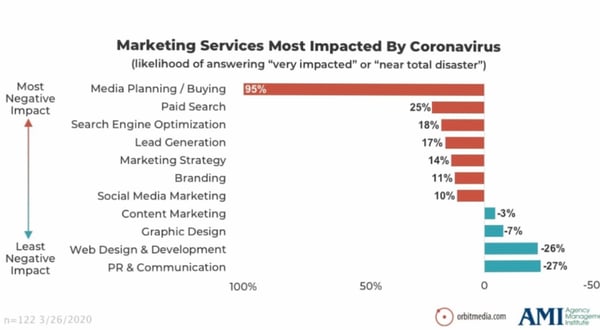
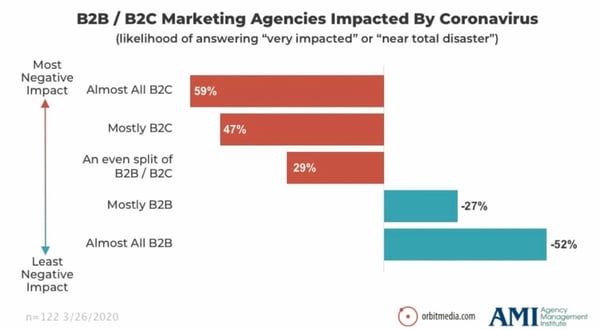
You can find more information about the impact and benefits of COVID-19 on agencies here to Orbit Media Studios research: https://www.orbitmedia.com/blog/coronavirus-agency-impact/
How to implement transparency in digital marketing?
Recently some online businesses chose to try and capitalise on the fear and paranoia in these uncertain times...
We've all seen high demand items being sold at extortionate prices, like hand sanitiser, protective masks, toilet paper etc.
At the moment money could be tight for many businesses, and transparency with the consumer might be essential for generating revenue.
According to Global Marketing Professor, 94% of consumers favour brands that show transparency in their marketing...
How to implement transparency in digital marketing?
Being transparent works for all businesses and it shouldn’t take a pandemic to make the switch.
How does your business show transparency?
Times are hard and businesses need all the help they can get. It's time to plan for the future and think of new ways to grow your business! Below are a few options that you should think about considering if you want to help your organisation stay afloat...
Do you use ‘social listening’ in your sales efforts?...

Studies suggest that customers acquired via social are seven times more likely to convert. Social listening can lead your team right to people who might need an extra push. You should be looking to connect with your target personas and engage with relevant content on their profiles.
Simple and brief touchpoints with your leads and prospects on social media can go a long way.
From warming up potential relationships to dealing with leads directly, having your ear to the ground and knowing who to approach for new opportunities is key.
Social selling shouldn't be a ‘hard sell’. Sow the seed from early with small actions.
What’s your experience with social listening?
I suspect for the next few months businesses won't be able to host events, trade shows or go on the road to make sales...this is where digital marketing comes in.
Technology has become essential in many marketing strategies recently.
For example, how many webinars have you been on recently, compared to a couple months ago?
Digital opens up a whole new way of doing business, that doesn't require face-to-face sales.
Digital marketing could play a major role in reshaping your business. Some benefits include:
 pplied universally, giving youbroader access to many new potential clients and expanding your consumer base.
pplied universally, giving youbroader access to many new potential clients and expanding your consumer base.Where are you focusing your digital marketing efforts?
"The purpose of content marketing is to create and share relevant written, downloadable, and visual media so your target audience can learn about your brand, expertise, and products or services." - HubSpot 2020 Marketing Statistics.
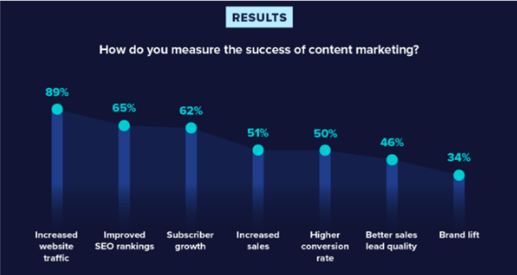
Content marketing is the foundation for a successful inbound marketing strategy.
Without content there would be nothing to optimise and nothing to share on social sites.
Here’s a list of some ways that content marketing might help you and your brand this year:
Content marketing is one of the many areas affected by the way people are living and working right now. Needs are changing, which I expect is influencing the majority of businesses to reassess content scheduled for publication and content strategy.
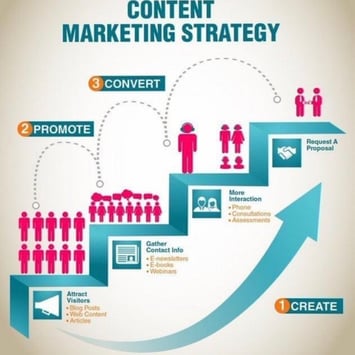
How do you stay relevant and current while strengthening your brand positioning as a solution to ongoing challenges?
The key is to pinpoint where you can be flexible and where you can’t, balancing content that aligns with business goals and content that aligns with the times.
These questions might come in handy to help with deciding on when and how to adapt your content plan:
When to adapt your content plan
How to adapt your content plan
Customer Service and Sales teams tend to be good at identifying common challenges, as they interact with customers and prospects every day.
Online behaviour is of course another indication, including changes to keyword searches, website activity, email engagement and discussions on social media. Whitepaper's
Whitepaper’s are educational resources that encourage readers to look further into the subject area being covered. They shouldn’t be salesy and shouldn’t focus on a product you offer.
Whitepaper's are great for:
 Showing you’re an industry thought leader
Showing you’re an industry thought leaderSimilarly, eBooks also focus on educating but read more like a book, with dedicated page breaks, a table of contents and helpful design elements that move the narrative along.
eBooks are great for:
Both are aimed at personas who are interested in educating themselves for the future.
Those interested in a top of funnel thought leadership piece can benefit from a whitepaper. Those interested in an asset that has quick takeaways and is visually more appealing can benefit from an eBook.
At the end of the day there’s no right or wrong choice, it’s all dependent on your content strategy goals.
This blog has taken a look into what agencies have been most effected by Coronavirus and ways to think about what you might need to consider in order to adapt your business during the pandemic.
There is certainly no denying that every organisation is having to come to terms with the outbreak, some have been hit with a huge loss to the point where they have had to make redundancies or liquidate, whereas others have seen an increase in revenue - giving them the opportunity to expand.
Will you be changing the way you run your business?